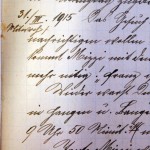 Augusta Carolina S. (geb. 1877) war als Tochter eines Baumeisters in Enns in Oberösterreich aufgewachsen. Ihr Ehemann Franz S. („Papi“) stammte aus Baden bei Wien und war als Rechnungsführer bei einer Baufirma tätig gewesen. Zur Zeit des Ersten Weltkriegs führten sie eine Gemischtwarenhandlung in Altlengbach im Wienerwald. Der Älteste ihrer drei Kinder war 1904 geboren worden, im Frühjahr 1915 stand die Geburt eines vierten Kindes unmittelbar bevor. Franz S. war im Frontdienst „in Russland“ krank geworden. Nach einem längerem Krankenhaus-Aufenthalt bemühte er sich um eine Position bei der Wasserleitungs-Wache in Altlengbach.
Augusta Carolina S. (geb. 1877) war als Tochter eines Baumeisters in Enns in Oberösterreich aufgewachsen. Ihr Ehemann Franz S. („Papi“) stammte aus Baden bei Wien und war als Rechnungsführer bei einer Baufirma tätig gewesen. Zur Zeit des Ersten Weltkriegs führten sie eine Gemischtwarenhandlung in Altlengbach im Wienerwald. Der Älteste ihrer drei Kinder war 1904 geboren worden, im Frühjahr 1915 stand die Geburt eines vierten Kindes unmittelbar bevor. Franz S. war im Frontdienst „in Russland“ krank geworden. Nach einem längerem Krankenhaus-Aufenthalt bemühte er sich um eine Position bei der Wasserleitungs-Wache in Altlengbach.
31./III. 1915 Mittwoch
Das Gesuch [von Jänner 1915, dass Franz S. zum Wasserleitungs-Dienst in der Heimatgemeinde eingesetzt wird] wird genehmigt und gerade als wir Papi benachrichtigen wollen daß das zu erwartende Kindchen kommen werde, kommt Mizzi [die jüngere Schwester der Schreiberin aus Enns] mit den Worten zu mir ins Zimmer – es ist nicht mehr nötig! „Franz ist schon selbst da!“ Wieder warst du gut! Mein Gott! – u. nochmal ein Warten in Hangen u. Bangen, u. Sorgen u. Mühen … abends um 9 Uhr 50 Minut. ist (in Todesnot) unsere kl. Fränzl, endlich da. Continue reading

![Handschrift von Maria E., 1915 [Zum Vergrößern an klicken] NL 174 Handschrift Maria E](https://salon21.univie.ac.at/wp-content/uploads/NL-174-Handschrift-Maria-E-150x150.jpg)